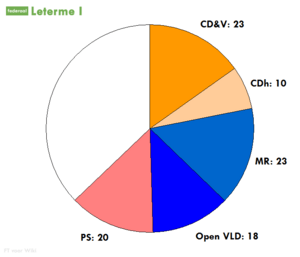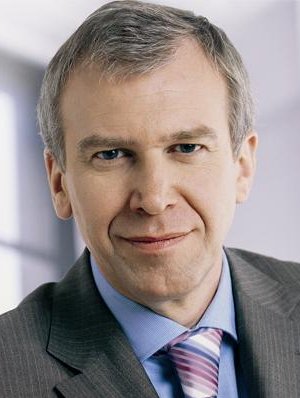Leterme I Government facts for kids
The Leterme I Government was the group of leaders who ran the country of Belgium for a short time. This government was in charge from March 20, 2008, until December 22, 2008. It started when Yves Leterme, a politician from the CD&V party, became the Prime Minister.
This government was formed after the Belgian general election of 2007. It was a team made up of five different political parties. These included two Dutch-speaking parties, the Christian Democratic and Flemish (CD&V) and the Open Flemish Liberals and Democrats (Open VLD). There were also three French-speaking parties: the Reformist Movement (MR), the Socialist Party (PS), and the Humanist Democratic Centre (CDH).
The government got the support of the Chamber of Representatives (like a parliament) on March 22, 2008. Most members voted for it. After this government, a new one took over, led by Herman Van Rompuy from the CD&V party, starting on December 30, 2008.
Contents
Who Was in the Leterme I Government?
The Leterme I Government had 15 ministers and seven secretaries of state. These people were in charge of different parts of the country's work.
| Minister | Name | Party | |
|---|---|---|---|
| Prime Minister | Yves Leterme | CD&V | |
| Deputy Prime Minister - Finance and Institutional Reforms | Didier Reynders | MR | |
| Deputy Prime Minister - Social Affairs and Public Health | Laurette Onkelinx | PS | |
| Deputy Prime Minister - Interior | Patrick Dewael | Open VLD | |
| Deputy Prime Minister - Justice and Institutional Reforms | Jo Vandeurzen | CD&V | |
| Deputy Prime Minister - Employment and Equal Opportunities | Joëlle Milquet | CDH | |
| Foreign Affairs | Karel De Gucht | Open VLD | |
| SMEs, the Self-employed, Agriculture and Science Policy | Sabine Laruelle | MR | |
| Social Integration, Pensions and Large Cities | Marie Arena | PS | |
| Defence | Pieter De Crem | CD&V | |
| Climate and Energy | Paul Magnette | PS | |
| Development Cooperation | Charles Michel | MR | |
| Civil Service and Public Enterprises | Inge Vervotte | CD&V | |
| Enterprise and Simplification | Vincent Van Quickenborne | Open VLD | |
| Migration and Asylum Policy | Annemie Turtelboom | Open VLD | |
| Secretary of State | Name | Party | |
| Mobility (Prime Minister) | Etienne Schouppe | CD&V | |
| Coordination of the Fight against Fraud (Prime Minister) | Carl Devlies | CD&V | |
| Finance (Finance) | Bernard Clerfayt | FDF | |
| Preparation of the European Presidency (Foreign Affairs) | Olivier Chastel | MR | |
| Fight against Poverty (Social Integration, Pensions and Large Cities) | Jean-Marc Delizée | PS | |
| Disabled Persons (Social Affairs and Public Health) | Julie Fernandez Fernandez | PS | |
| Budget (Prime Minister) and Family Policy (Employment) | Melchior Wathelet Jr. | CDH |
Changes in Government Members
During its time, there were a couple of changes in the government team:
- In April 2008, Frédéric Laloux (PS) left his role. He was replaced by Jean-Marc Délizée.
- In December 2008, Jo Vandeurzen resigned from his roles. This happened because of questions about whether he and Yves Leterme had tried to influence a court case. Soon after, Yves Leterme offered the resignation of the entire government.
Why the Government Faced Challenges
The Leterme I Government faced two main challenges during its time. These challenges eventually led to its end.
First Challenge: Constitutional Reforms
In July 2008, the government was working on big changes to Belgium's rules (called constitutional reform). They also needed to fix a problem with an election area called Brussels-Halle-Vilvoorde. After many talks, they couldn't agree on a solution by the deadline.
Because of this, on July 14, 2008, Prime Minister Yves Leterme offered the government's resignation to King Albert II. However, the King decided not to accept it. Instead, he asked some other politicians to help find a way to continue the talks about the reforms.
Second Challenge: The Fortis Bank Case
On December 19, 2008, Prime Minister Yves Leterme again offered his government's resignation to King Albert. This time, it was because of a big problem involving the sale of a bank called Fortis to another bank, BNP Paribas.
There were concerns that Yves Leterme, Jo Vandeurzen, and Didier Reynders had tried to influence a court decision about the Fortis sale. This raised questions about the separation of powers, which means that the government, courts, and law-making bodies should operate independently. Three days later, King Albert accepted the government's resignation.



